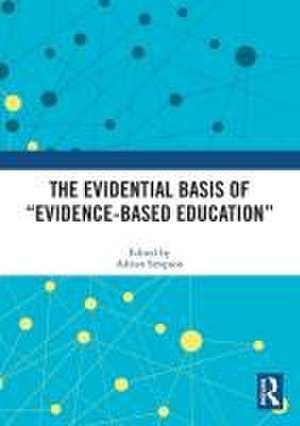The Evidential Basis of “Evidence-Based Education”
Editat de Adrian Simpsonen Limba Engleză Paperback – 29 ian 2024
EBE advocates promote particular, restricted approaches to determining policy and practice in schools, with only some forms of evidence accepted as legitimate. Experimental methods designed for the well-controlled environments of science and medicine in which subjects and treatments can be isolated are nonetheless promoted as ‘the gold standard’ even when transposed to complex social situations of interacting teachers and learners. This book explores some of the problems with this approach. It examines the background to disputes about evidence, the reasons EBE arguments have become so powerful in modern bureaucracies, the way practitioners might reason using evidence and the concerns about key notions of rigour, science, representativeness and effect size, which are often mistakenly interpreted in EBE.
The chapters in this book were originally published in a special issue of the journal, Educational Research and Evaluation.
| Toate formatele și edițiile | Preț | Express |
|---|---|---|
| Paperback (1) | 376.10 lei 6-8 săpt. | |
| Taylor & Francis – 29 ian 2024 | 376.10 lei 6-8 săpt. | |
| Hardback (1) | 999.16 lei 6-8 săpt. | |
| Taylor & Francis – 8 iun 2020 | 999.16 lei 6-8 săpt. |
Preț: 376.10 lei
Nou
Puncte Express: 564
Preț estimativ în valută:
71.99€ • 74.87$ • 60.32£
71.99€ • 74.87$ • 60.32£
Carte tipărită la comandă
Livrare economică 13-27 martie
Preluare comenzi: 021 569.72.76
Specificații
ISBN-13: 9780367520342
ISBN-10: 0367520346
Pagini: 152
Dimensiuni: 174 x 246 x 8 mm
Greutate: 0.26 kg
Ediția:1
Editura: Taylor & Francis
Colecția Routledge
Locul publicării:Oxford, United Kingdom
ISBN-10: 0367520346
Pagini: 152
Dimensiuni: 174 x 246 x 8 mm
Greutate: 0.26 kg
Ediția:1
Editura: Taylor & Francis
Colecția Routledge
Locul publicării:Oxford, United Kingdom
Public țintă
Postgraduate and UndergraduateCuprins
An Introduction to the evidential basis of “evidence-based education”
1. Evidence of confusion about evidence of causes: comments on the debate about EBP in education
2. Practitioner tales: possible roles for research evidence in practice
3. The key role of representativeness in evidence-based education
4. What is meant by “rigour” in evidence-based educational policy and what’s so good about it?
5. For whom does “what works” work? The political economy of evidence-based education
6. Separating arguments from conclusions: the mistaken role of effect size in educational policy research
7. Evidence-based teaching: a simple view of “science”
8. Some reflections on the role of evidence in improving education
1. Evidence of confusion about evidence of causes: comments on the debate about EBP in education
2. Practitioner tales: possible roles for research evidence in practice
3. The key role of representativeness in evidence-based education
4. What is meant by “rigour” in evidence-based educational policy and what’s so good about it?
5. For whom does “what works” work? The political economy of evidence-based education
6. Separating arguments from conclusions: the mistaken role of effect size in educational policy research
7. Evidence-based teaching: a simple view of “science”
8. Some reflections on the role of evidence in improving education
Notă biografică
Adrian Simpson is The Principal of Josephine Butler College and Professor of Mathematics Education at Durham University. His main interests are the school–university transition, proof and reasoning, and evidence for practice in education.
Descriere
"Evidence-based education" (EBE) is a catchline for policy makers and school leaders alike, with its advocates promoting their work as being "rigorous" and "scientific". The chapters in this book place this approach in context and challenge whether the arguments it leads to live up to the hype.
